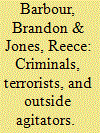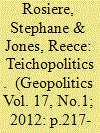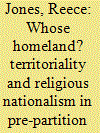| Srl | Item |
| 1 |
ID:
121436


|
|
|
|
|
| Publication |
2013.
|
| Summary/Abstract |
This article is a critical geopolitical analysis of Chinese media representations of the 5 July 2009 riots in Xinjiang, China. Significant events often define the geopolitical climate by creating a space for the construction of boundaries between identity categories and the appropriate norms for behaviour towards the Other. The post-riot reports framed the event through the prism of the global war on terror to justify a violent response to protect Chinese citizens from the perceived threat of the Other. After connecting theories of narratives, the event, and group making, the article identifies three representational tropes - the criminal, the terrorist, and the outside agitator - in Chinese documents that create boundaries between the identity categories Uyghur and Han and define how the Other should be treated. The three representation tropes of the Other in the aftermath of the 5 July riots simultaneously situate the protestors as outside Chinese society and perpetuate the claim of the superiority of Chinese culture and civilisation.
|
|
|
|
|
|
|
|
|
|
|
|
|
|
|
|
| 2 |
ID:
111647


|
|
|
|
|
| Publication |
2012.
|
| Summary/Abstract |
This article considers the trend in many countries towards securitised immigration policies and "hardening" of borders through the construction of walls or fences. In contrast the borderless world of globalisation, it identifies these attempts to strengthen control of borders as teichopolitics: the politics of building barriers. This article analyses the different types of hardened borders that exist today and proposes a typology of frontlines, fences/walls, and closed straights. Then the article maps the locations of these barriers and argues that although other justifications ranging from smuggling to terrorism are often put forward, these barriers are mostly connected with managing immigration flows. Indeed, many of these barriers are located on important economic or social discontinuity lines, precisely where the system reveals its underlying logics. These walls and fences symbolise the emergence of a privileged few who actually live the promise of globalisation and defend its privileges through teichopolitics.
|
|
|
|
|
|
|
|
|
|
|
|
|
|
|
|
| 3 |
ID:
075664


|
|
|
|
|
| Publication |
2006.
|
| Summary/Abstract |
Scholarly inquiries into communalism in South Asia have often exclusively focused on politically constructed religious and ethnic identity categories. This article challenges these assumptions by arguing that territoriality and the designation of homelands played an important, but largely unrecognized, role in developing social and political boundaries in the region. By analyzing the writings of Bipin Chandra Pal during the Swadeshi period, this article points to the territorialization of a Hindu-based version of the national homeland as a key process in the development of communal difference in Bengal and South Asia more generally. It is concluded that the Hindu-dominated rhetoric of the early nationalist movement implicitly marked Hindus as the only true members of the nation. By implicitly excluding all other forms of social affiliations from the narrative of the homeland, it is argued that the stage was set for the contestation of territorial identity categories that played out through the 20th century in Bengal.
|
|
|
|
|
|
|
|
|
|
|
|
|
|
|
|